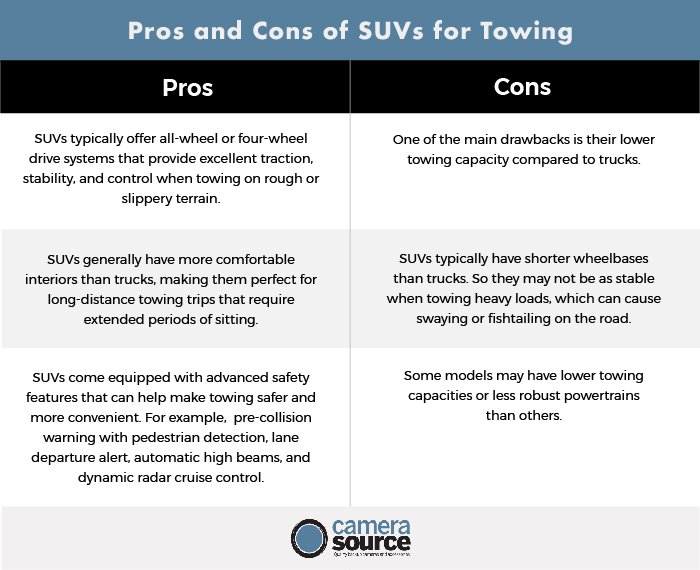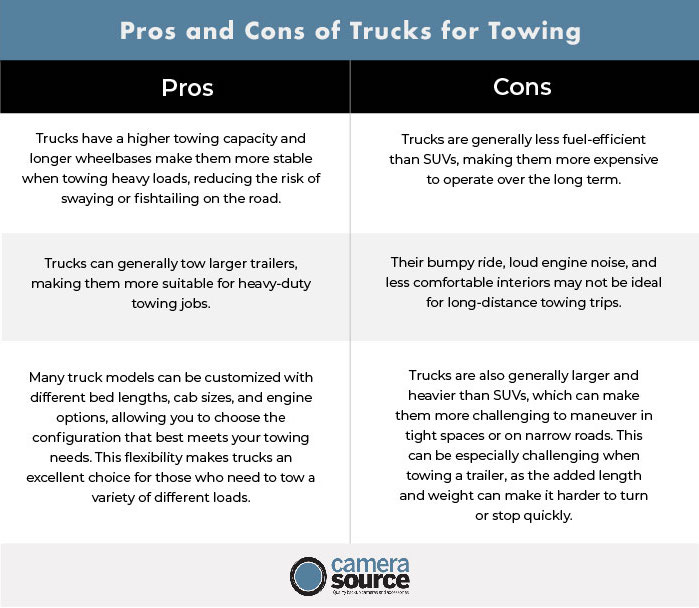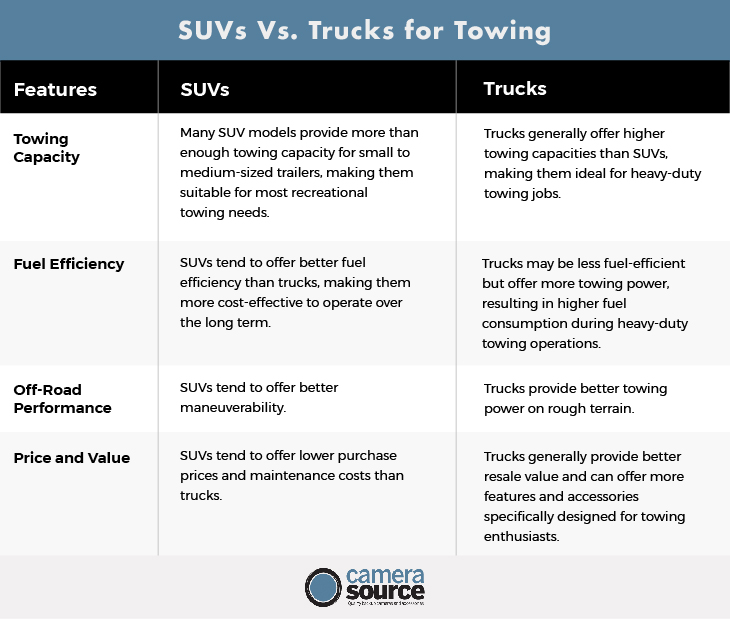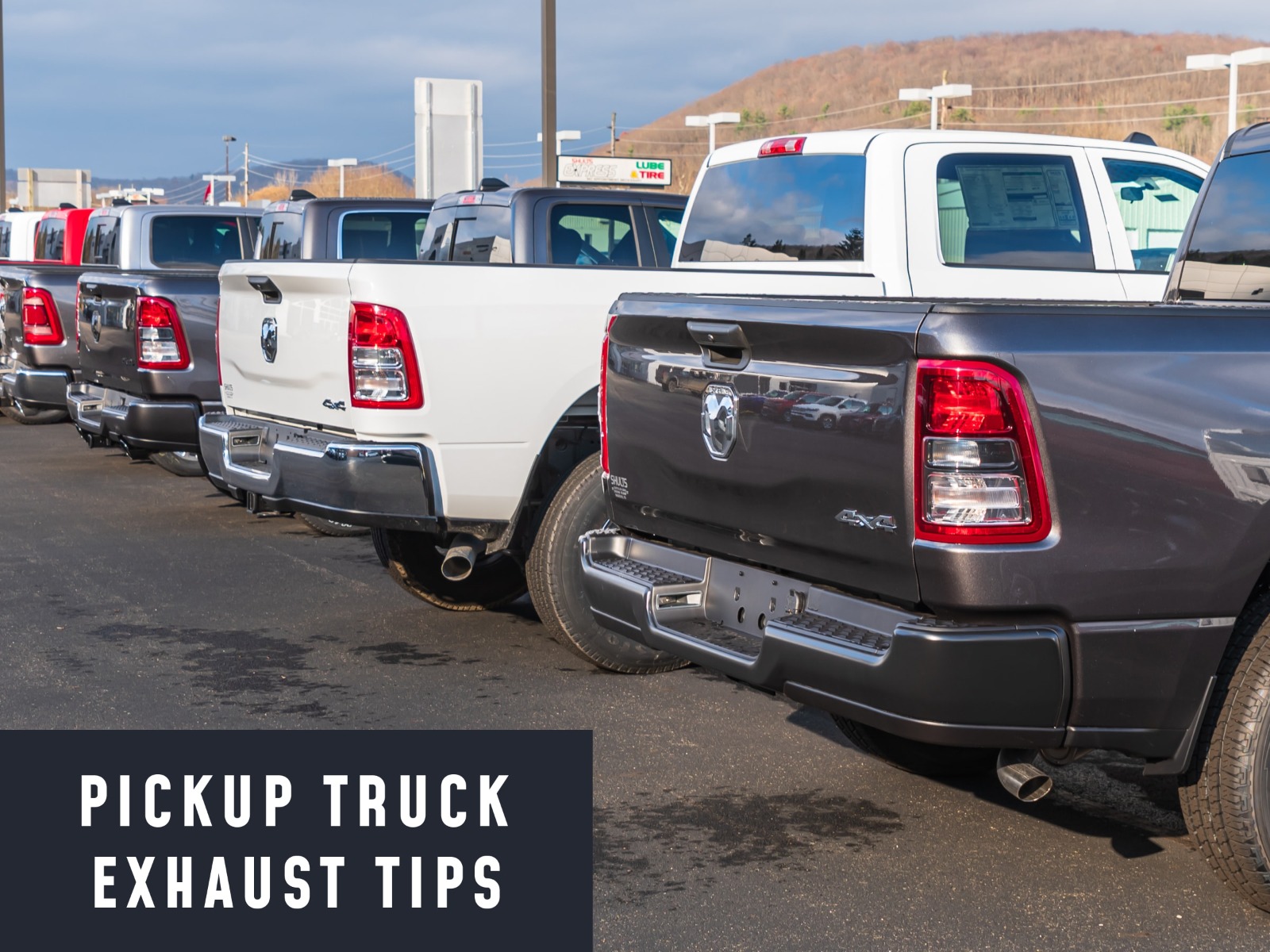The Ultimate Showdown: Comparing the Towing Capabilities of SUVs vs. Trucks
When it comes to towing heavy loads, whether for recreation or work purposes, choosing the right vehicle is crucial! Among the most popular options are sport utility vehicles (SUVs) and trucks.
Both vehicles offer their own advantages and limitations, making it essential to weigh their towing capabilities against your specific needs. In this article, we will explore the factors involved in towing, along with the towing capacities of different SUV and truck models, in order to help you make an informed decision.
So, let’s get into it! But, first things first, we have to understand what towing capacity is.
What is Towing Capacity
Towing capacity refers to the maximum amount of weight a vehicle can tow without compromising its safety and performance. This weight includes the weight of the trailer or object being towed, along with any cargo or passengers in the towing vehicle.
This information is typically provided by the vehicle manufacturer and is a crucial factor in determining which vehicle is suitable for your towing needs. Failure to adhere to a vehicle's towing capacity can lead to severe safety issues, such as:
- Engine overheating
- Transmission failure
- Brake failure
- Amongst others.
There are multiple factors that can affect a vehicle’s towing capacity, and it is also important to understand this. So let’s get into the main ones.
The 5 Factors that Affect Towing Capacity
There are several factors that affect a vehicle's towing capacity. Here are the main five!
- The engine power, which is a crucial factor as it provides the necessary torque to pull the weight of the load.
- The transmission, which also plays a role in towing capacity as it needs to be able to handle the extra load.
- The brakes, which are essential to ensure that the vehicle can stop safely while towing.
- The suspension system, which needs to be able to handle the extra weight and maintain stability.
- And the frame strength, which is also an important factor as it needs to be able to handle the extra stress put on it while towing.
Additionally, the vehicle's weight and cargo capacity can play a role in determining towing capacity. If the towing vehicle is already carrying a heavy load, it may not be able to tow as much weight. So keep this in mind.
The Importance of Towing Capacity during Vehicle Selection
When selecting a vehicle for towing, it is essential to consider the towing capacity alongside other factors such as fuel efficiency, cargo capacity, and driving performance.
Choosing a vehicle with a towing capacity that exceeds your needs may lead to higher costs, such as increased fuel consumption or a higher purchase price, without providing any additional benefits.
It is also important to consider the type of towing you will be doing. For example, if you plan on towing a large camper or boat, you will need a vehicle with a higher towing capacity. However, if you only plan on towing a small trailer or equipment, a vehicle with a lower towing capacity may be sufficient.
By taking into account the various factors that affect towing capacity, you can ensure that you select a vehicle that can safely and efficiently tow the weight you require.
SUVs and Their Towing Capabilities
SUVs have become one of the most popular options for towing due to their versatility, comfort, and spacious interiors. Many SUV models provide ample towing capacity, making them ideal for towing small to medium-sized trailers.
However, it's important to consider several factors when selecting an SUV for towing, including the vehicle's weight, braking system, and powertrain. Here are some popular SUV models that are usually used for towing.
The 5 Most Popular SUV Models for Towing
Some of the most popular SUV models for towing include the Dodge Durango, Ford Expedition, Chevrolet Tahoe, Toyota 4Runner, and Jeep Grand Cherokee. These models are equipped with powerful engines, robust transmissions, and heavy-duty frames capable of handling significant towing loads.
The Dodge Durango, for example, has a maximum towing capacity of up to 8,700 pounds when properly equipped. Its standard 3.6-liter V6 engine provides 295 horsepower and 260 lb-ft of torque, while its available 5.7-liter V8 engine delivers up to 360 horsepower and 390 lb-ft of torque.
The Ford Expedition is another popular SUV for towing, with a maximum towing capacity of up to 9,300 pounds when equipped with the Heavy-Duty Trailer Tow Package. Its standard 3.5-liter EcoBoost V6 engine generates 375 horsepower and 470 lb-ft of torque, while its available 3.0-liter Power Stroke Diesel engine provides up to 440 lb-ft of torque.
Pros and Cons of SUVs for Towing
SUVs offer several advantages over trucks when it comes to towing. It also has its drawbacks. The good thing is that we made this list for you, so you can take all the factors into consideration before making your decision!

Overall, SUVs are an excellent choice for those who need to tow small to medium-sized trailers and want the comfort and convenience of an SUV. With the right equipment and proper driving techniques, SUVs can provide a safe and enjoyable towing experience for years to come.
Trucks and Their Towing Capabilities
Trucks are renowned for their towing capabilities and are often the preferred choice for towing heavy loads! But there are also quite a few drawbacks to consider before going head first into this decision.
The good thing is that we made this list for you, so you can take all the factors into consideration before making your decision!
Truck models come in different sizes and designs, but in general, they offer greater towing capacities than SUVs. Like SUVs, trucks come with various features and factors to consider when selecting the right one for your towing needs.
You'll want to make sure that your truck has the right towing capacity and features to handle the load safely and efficiently. Here are some popular options!
The 5 Most Popular Truck Models for Towing
Some of the most popular truck models for towing include the Ford F-150, Ram 1500, Chevy Silverado 1500, GMC Sierra 1500, and Toyota Tundra. These models come equipped with powerful engines, robust suspension systems, and heavy-duty frames that can handle significant towing loads.
They are also available with a range of towing features, such as trailer sway control, integrated trailer brake controllers, and towing mirrors. If you're in the market for a new truck for towing, it's worth considering these popular models.
They have a proven track record when it comes to towing, and they offer a range of features that can make your towing experience safer and more comfortable!

Despite these limitations, trucks remain a popular choice for those who need to tow heavy loads. With the right truck and the right towing equipment, you can safely and efficiently tow almost anything you need!
SUVs Vs. Trucks for Towing
Last, but not least, when comparing SUVs and trucks for towing capabilities, there are a few other factors that come into play!
It's essential to consider the towing capacity, fuel efficiency, off-road towing performance, and value for money, among others. Here is a breakdown!

Choosing between an SUV and a truck for towing ultimately depends on your specific needs and preferences. Both vehicles offer their own advantages and limitations, making it essential to consider factors such as towing capacity, fuel efficiency, off-road performance, and value for money when making your selection.
By weighing these factors against your towing needs, you can choose the perfect vehicle that will provide a safe, reliable, and enjoyable towing experience. So keep these factors in mind when your next towing needs come up!








